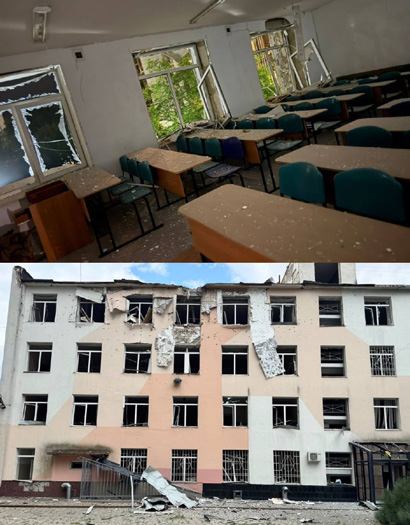News from the MCAA - Marie Curie changes Lives. Mine included - September 2025
Newsletter
Research journey
As a legal scholar from Ukraine, my MSCA4Ukraine fellowship was about more than just academic support: It offered me and my 4-year-old son protection, continuity and the opportunity to establish something long-lasting. I have led an interdisciplinary project at the SAGE Laboratory at the University of Strasbourg, focusing on the execution of European Court of Human Rights judgements at a local level, by local and regional authorities. The intersection of human rights and local self-government is not just an academic topic – it concerns real people, the quality of our everyday life and real challenges to make it better.
I started my fellowship in mid-2023, so I can answer the question: “What does it mean when a research grant becomes a matter of life or death?”
MSCA4Ukraine saved me and kept me connected
Although now I live and work in France, I still feel connected to Ukraine and my university in Odessa. Our university buildings were damaged by missile fragments twice. Without the MSCA4Ukraine grant, I would not be able to continue my research, publish papers, teach students or support my colleagues. During the blackouts in Ukraine, I was able to deliver online classes to displaced students and assist Ukrainian colleagues in maintaining their study programmes. Thanks to the stability that the fellowship provided, I was able to publish several peer-reviewed articles in open-access journals, participate in Council of Europe activities and develop training materials on human rights and local democracy.
This fellowship is not just about academic results; it's also about people. It enabled me to be part of the European academic and legal community while continuing to contribute to Ukraine. It has given my mobility a purpose and enabled me to grow professionally and personally – yes, one of the most distinctive features of the MSCA programme is its combination of research and professional development. From the very start, the MSCA4Ukraine team has provided valuable advice and resources. I carefully considered the recommendations about what fellows can and should do beyond research, and I can honestly say that they are all well thought out and helpful.

Natalia Mishyna
Bionote
Natalia Mishyna is a legal scholar and governance expert based in France, currently a researcher at the SAGE Laboratory, University of Strasbourg, and a former MSCA4Ukraine Fellow (2023–2025). With over 25 years of experience in comparative constitutional law, human rights – particularly social rights – and municipal governance, she works at the intersection of law, policy, and sustainable development. Natalia advises the Council of Europe on local democracy and social policy reforms and has extensive experience in EU-funded projects. Her current research explores the changing role of local authorities in advancing social rights, implementing the SDGs, and acting as emerging subjects in international law.

Odessa, Ukraine, spring 2025. Image from the official Instagram account of the National University Odessa Academy of Law, https://www.instagram.com/nuoua_ official/
For example, initially, I wasn’t sure whether to spend time and money on French language courses. I thought: “This war will end soon, and I will finish my project and go home.” However, I decided to follow the advice and attend French classes twice a week. Later, when I was invited to the Congress of Local and Regional Authorities of the Council of Europe, I was happy about my decision, as the meetings were in French and I understood practically everything. That was the first time I really saw how important learning French was.
I would like to thank everyone involved in the MSCA4Ukraine programme, the European Commission and all EU citizens. Thanks to you, I have been able to stay safe, develop my knowledge and skills, and continue helping others as both a researcher and a legal expert.
What I would like to say to future fellows:
• Don't ignore the professional development element – it's extremely useful and everything included has a purpose.
• Open Science and public communication, including on professional social media, are important because they make your work useful to more people.
• Use this time to build bridges between countries, universities, colleagues, and ideas. This is a special opportunity for you. Thanks to the MSCA programme, you have many resources to make society a better place!
Natalia Mishyna
Orcid
LinkedIn
University of Strasbourg, France
mishyna@unistra.fr